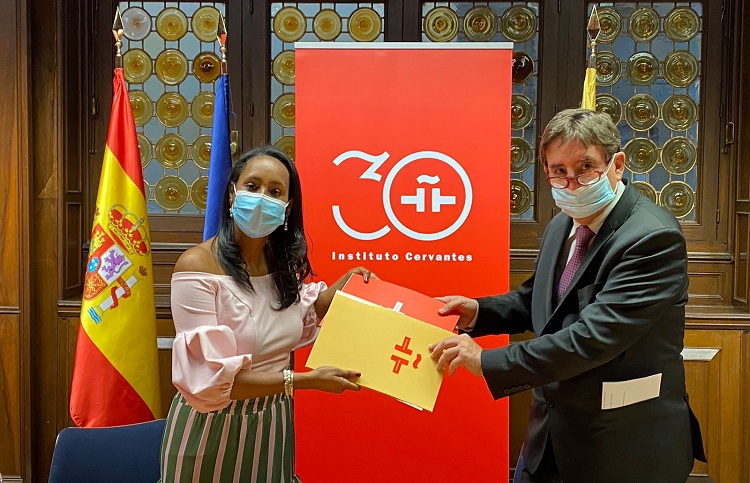The Diplomat
The Minister of Culture of Colombia, Angélica Mayolo, deposited last Thursday in the Caja de las Letras of the Instituto Cervantes in Madrid a legacy from the Instituto Caro y Cuervo (ICC) consisting of a selection of publications related to the linguistic heritage and multicultural character of Colombia.
During the event, which coincided with the official visit to Spain of the president of Colombia, Iván Duque, the Instituto Cervantes and the ICC also signed the extension for three more years (until 2024) of the 2018 cultural collaboration agreement, in the presence of the secretary general of ASALE (Association of Spanish Language Academies), Francisco Javier Pérez.
As Minister Angélica Mayolo stated during the event, although the ICC works to promote the use and learning of Spanish, it faces the challenge of “not losing our native languages” and is therefore obliged to protect them. This “valuable research” is a reflection of the diversity of the Hispanic world and a sign that “we are a multicultural and multiethnic country”, she added. Colombia has more than 65 living indigenous languages (although some are in danger of extinction), two creole languages, the gypsy language and Colombian sign language, in addition to Spanish.
For his part, the director of Cervantes, Luis García Montero, expressed his admiration for the work carried out by the ICC since its creation in 1942, which earned it the Prince of Asturias Award for Communication and Humanities in 1999. “The riches of communities are their languages and their cultures”, he continued. “We philologists have learned the coexistence between unity and diversity: nuances make us rich”, he added.
The legacy was kept in box number 1420 in the vault at the Cervantes headquarters until it is incorporated into the Cervantes Heritage Library. The event served to confirm the Caro y Cuervo’s commitment to the study, safeguarding and dissemination of these languages, and also to express the need to defend minority languages and the survival of multilingualism.
The rich legacy, according to Juan Manuel Espinosa Restrepo, deputy academic director of the ICC, contains copies of Apuntaciones críticas sobre el lenguaje bogotano, by Rufino José Cuervo; Obras inéditas, also by Cuervo (the first work published by the ICC when it did not yet bear this name); and Literatura romana, by Federico Leo; the renowned Diccionario de Colombianismos or the translations into eleven native languages of Colombia of the Universal Declaration of Human Rights and the Native Languages Law of 2010. The legacy left this Thursday continues the trail opened by that of Colombian Andrés Bello (the first edition of his prestigious Gramática), which was kept in the Caja de las Letras when the pan-Hispanic platform Canoa was presented at the Cervantes, an initiative to internationalize culture in Spanish launched in 2019 by the National Autonomous University of Mexico (UNAM), the Caro y Cuervo Institute and the Inca Garcilaso Cultural Center (Peru).






